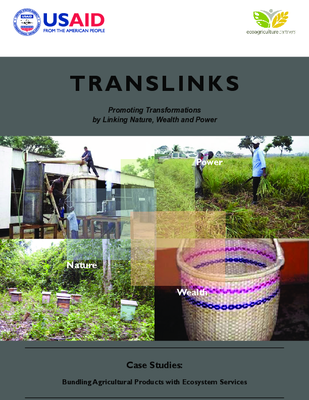Case Studies: Bundling Agricultural Products with Ecosystem Services

This paper examines how bundling of ecosystem services into agricultural products (BESAP) markets are actually being set up on the ground, drawing lessons learned from six cases in Africa and Latin America
Information relevant to Learning Questions:
Are enabling conditions in place to support a sustainable enterprise?
- Stakeholder alignment, diversification
- Market demand, profit potential, access to credit/capital
- Governance
- Policies for enterprises, business alliances
- Financial management capacity, technical capacity
- Inputs, equipment, infrastructure
- Benefit sharing, targeted participants, combined strategic approaches, biodiversity linkage, policies for and enforcement of resource use, external disturbance
Does the enterprise lead to benefits to stakeholders?
- Increased income for participants
- Non-cash benefits
Do the benefits lead to positive changes in attitudes and behavior?
- Not addressed
Does a change in stakeholders’ behaviors lead to a reduction to threats to biodiversity (or restoration)?
- Residential and commercial development
- Agriculture and aquaculture
- Biological resource use
Does a reduction in threats (or restoration) lead to conservation?
- Forest ecosystems
- Freshwater ecosystems
- Grassland ecosystems
- Species
Enterprise Types:
- Crops: coffee
- Non-timber forest products: essential oils, bamboo, Allanblackia nuts
- Other natural products: honey
Document type:
- Case-study
- Report

